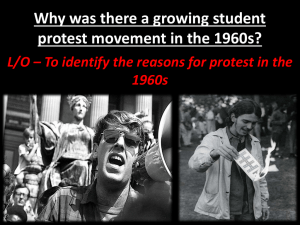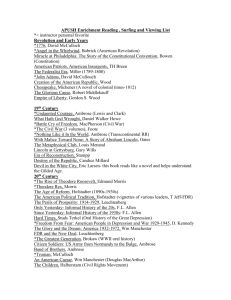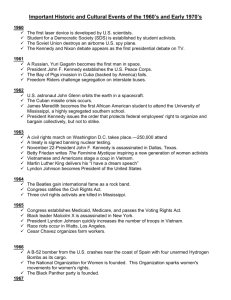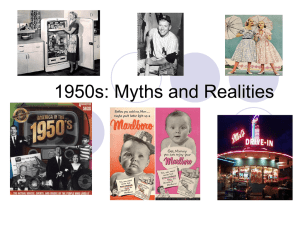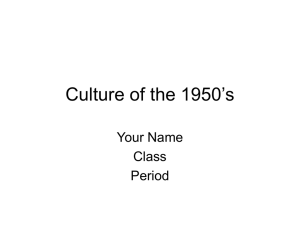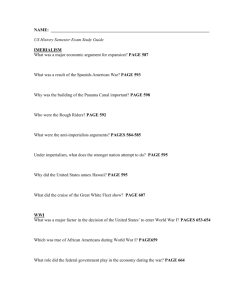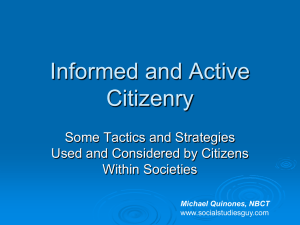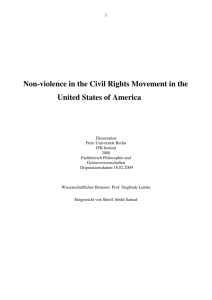United States History Research Paper Topics
advertisement
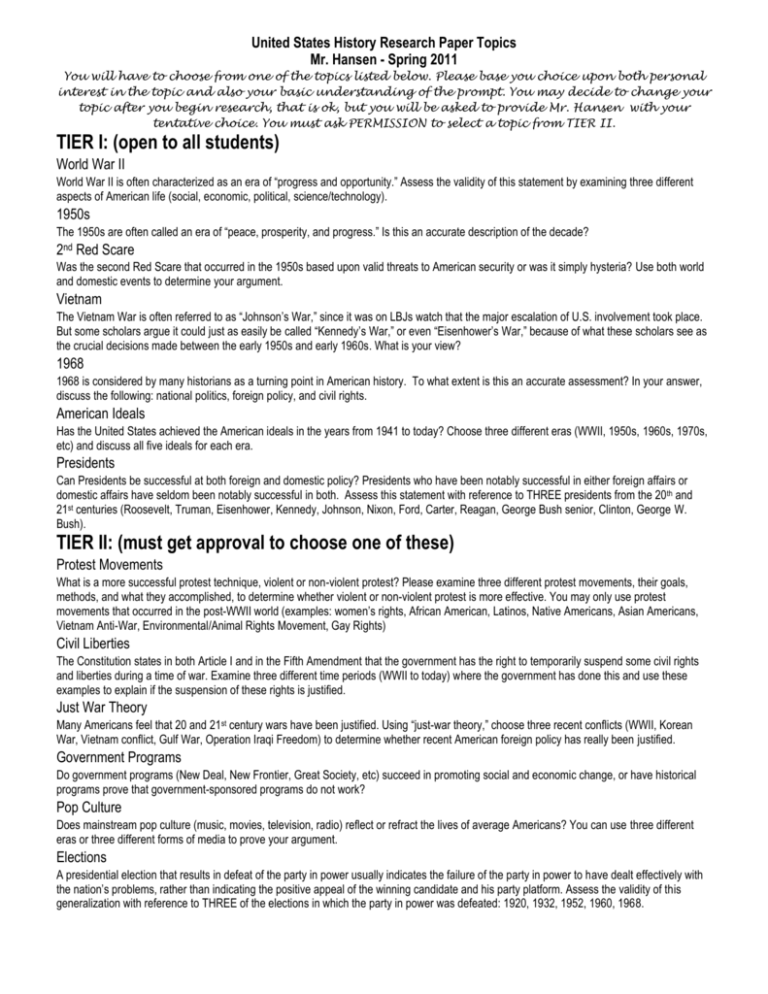
United States History Research Paper Topics Mr. Hansen - Spring 2011 You will have to choose from one of the topics listed below. Please base you choice upon both personal interest in the topic and also your basic understanding of the prompt. You may decide to change your topic after you begin research, that is ok, but you will be asked to provide Mr. Hansen with your tentative choice. You must ask PERMISSION to select a topic from TIER II. TIER I: (open to all students) World War II World War II is often characterized as an era of “progress and opportunity.” Assess the validity of this statement by examining three different aspects of American life (social, economic, political, science/technology). 1950s The 1950s are often called an era of “peace, prosperity, and progress.” Is this an accurate description of the decade? 2nd Red Scare Was the second Red Scare that occurred in the 1950s based upon valid threats to American security or was it simply hysteria? Use both world and domestic events to determine your argument. Vietnam The Vietnam War is often referred to as “Johnson’s War,” since it was on LBJs watch that the major escalation of U.S. involvement took place. But some scholars argue it could just as easily be called “Kennedy’s War,” or even “Eisenhower’s War,” because of what these scholars see as the crucial decisions made between the early 1950s and early 1960s. What is your view? 1968 1968 is considered by many historians as a turning point in American history. To what extent is this an accurate assessment? In your answer, discuss the following: national politics, foreign policy, and civil rights. American Ideals Has the United States achieved the American ideals in the years from 1941 to today? Choose three different eras (WWII, 1950s, 1960s, 1970s, etc) and discuss all five ideals for each era. Presidents Can Presidents be successful at both foreign and domestic policy? Presidents who have been notably successful in either foreign affairs or domestic affairs have seldom been notably successful in both. Assess this statement with reference to THREE presidents from the 20th and 21st centuries (Roosevelt, Truman, Eisenhower, Kennedy, Johnson, Nixon, Ford, Carter, Reagan, George Bush senior, Clinton, George W. Bush). TIER II: (must get approval to choose one of these) Protest Movements What is a more successful protest technique, violent or non-violent protest? Please examine three different protest movements, their goals, methods, and what they accomplished, to determine whether violent or non-violent protest is more effective. You may only use protest movements that occurred in the post-WWII world (examples: women’s rights, African American, Latinos, Native Americans, Asian Americans, Vietnam Anti-War, Environmental/Animal Rights Movement, Gay Rights) Civil Liberties The Constitution states in both Article I and in the Fifth Amendment that the government has the right to temporarily suspend some civil rights and liberties during a time of war. Examine three different time periods (WWII to today) where the government has done this and use these examples to explain if the suspension of these rights is justified. Just War Theory Many Americans feel that 20 and 21st century wars have been justified. Using “just-war theory,” choose three recent conflicts (WWII, Korean War, Vietnam conflict, Gulf War, Operation Iraqi Freedom) to determine whether recent American foreign policy has really been justified. Government Programs Do government programs (New Deal, New Frontier, Great Society, etc) succeed in promoting social and economic change, or have historical programs prove that government-sponsored programs do not work? Pop Culture Does mainstream pop culture (music, movies, television, radio) reflect or refract the lives of average Americans? You can use three different eras or three different forms of media to prove your argument. Elections A presidential election that results in defeat of the party in power usually indicates the failure of the party in power to have dealt effectively with the nation’s problems, rather than indicating the positive appeal of the winning candidate and his party platform. Assess the validity of this generalization with reference to THREE of the elections in which the party in power was defeated: 1920, 1932, 1952, 1960, 1968.
![The Politics of Protest [week 3]](http://s2.studylib.net/store/data/005229111_1-9491ac8e8d24cc184a2c9020ba192c97-300x300.png)
